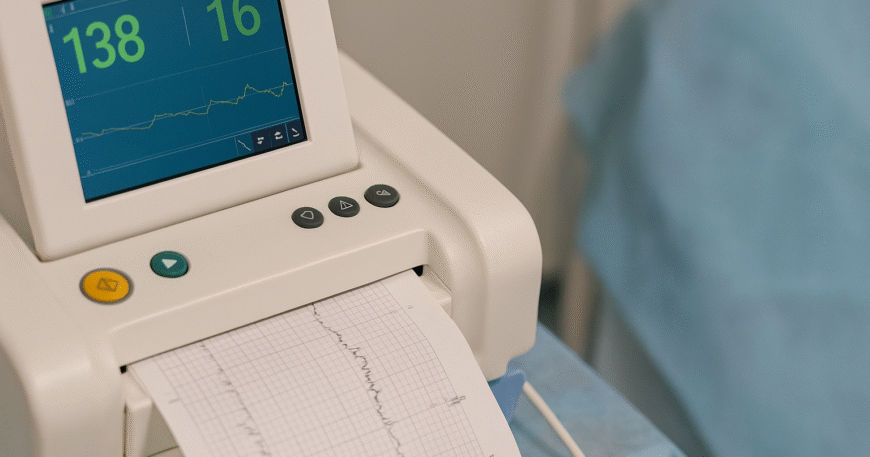
CTG Machine: The Technology Behind Fetal Monitoring Every Mother Should Understand
Understanding how a CTG machine works is essential for expectant mothers. A CTG, or cardiotocography machine, is a device used to monitor the baby’s heartbeat and the mother’s contractions during pregnancy and labor. It plays a vital role in ensuring the health and safety of both mother and child. At Shaafi Hospital Alipur Islamabad, we use advanced CTG machines to ensure accurate and timely monitoring, giving peace of mind to every mother.
What Is a CTG Machine?
A CTG machine records the fetal heart rate and uterine contractions to assess fetal well-being. It uses two transducers: one placed on the mother’s abdomen to monitor the baby’s heart rate and the other to track uterine contractions. The data is printed on paper or displayed on a screen.
CTG tests help in evaluating whether the baby is getting enough oxygen and whether the uterus is contracting normally. This information can guide doctors during labor or in high-risk pregnancies.
Why CTG Testing Matters During Pregnancy
CTG testing becomes particularly important in pregnancies that are overdue, involve complications like gestational diabetes, or show signs of reduced fetal movement. It allows doctors to:
- Detect fetal distress early
- Decide if early delivery is necessary
- Monitor the baby during labor
CTG Machine Price in Pakistan
The price of a CTG machine in Pakistan varies depending on the model and brand. Entry-level machines can start around PKR 250,000, while high-end models used in hospitals like Shaafi Hospital Alipur Islamabad can exceed PKR 1 million. The investment ensures accuracy and safety in monitoring.
What Is CTG in Pregnancy?
In pregnancy, CTG refers to the process of monitoring the baby’s heart rate and the mother’s contractions to evaluate the baby’s well-being. CTG is non-invasive and painless, making it a preferred choice in prenatal and labor care.
How CTG Monitoring Works
CTG monitoring involves attaching two sensors to the pregnant woman’s abdomen. One measures the baby’s heart rate, and the other tracks uterine contractions. The data is displayed in real time, helping doctors understand how the baby is responding to labor or other stress.
According to the NICE guideline for CTG monitoring, interpretation of results must be done by trained professionals to ensure accurate decisions are made during pregnancy and labor.
CTG Test in Pregnancy Normal Range
A normal CTG test in pregnancy shows a fetal heart rate between 110 and 160 beats per minute. It should also include accelerations and minimal or no decelerations. Uterine contractions should be regular and not too close together.
Any deviation from these ranges may indicate fetal distress and require immediate medical intervention.
The Role of CTG Electronic Fetal Monitoring
Electronic fetal monitoring using a CTG machine helps doctors monitor the baby continuously. This is especially useful during high-risk pregnancies or when labor is being induced. It provides data in real time, ensuring prompt medical response if needed.
CTG Procedure at Shaafi Hospital, Alipur, Islamabad
At Shaafi Hospital Alipur Islamabad, the CTG procedure is straightforward and comfortable:
- You lie down in a comfortable position.
- A nurse or doctor places the sensors on your belly.
- The machine begins recording data.
- The test usually takes 20 to 40 minutes.
Our trained staff ensures you feel relaxed and informed throughout the process.
What Makes CTG Machines Reliable?
CTG machines are reliable because they:
- Provide continuous and real-time data
- Are non-invasive
- Require minimal preparation
- Are safe for both mother and baby
With technological advancements, modern CTG machines now come with digital displays, wireless capabilities, and smart data interpretation features.
Final Thoughts
A CTG machine is more than just hospital equipment—it’s a guardian for the unborn baby. With proper use and trained staff, it becomes an essential part of prenatal care and delivery monitoring. At Shaafi Hospital Alipur Islamabad, we ensure our patients receive the best care using the most advanced CTG equipment available.
Whether you are in your final trimester or just exploring your birth plan, understanding how CTG machines work helps you feel more in control of your pregnancy journey.
FAQs
1. What does a CTG machine measure?
It measures the fetal heart rate and the mother’s uterine contractions to assess the baby’s well-being.
2. Is the CTG test painful?
No, it is a non-invasive and painless procedure typically done during late pregnancy or labor.
3. How long does a CTG test take?
A standard CTG test takes around 20 to 40 minutes.
4. When is a CTG test necessary?
It’s recommended during high-risk pregnancies, labor, or if there are concerns about fetal movement or distress.
5. What if the CTG test shows abnormal results?
Doctors may recommend further testing, close monitoring, or even early delivery depending on the baby’s condition.
Call to Action
Expecting a baby? Let our experts at Shaafi Hospital Alipur Islamabad ensure a safe and well-monitored pregnancy. Book your CTG test today and get personalized care from our experienced OB-GYN team.
Call us now at 051 2615517 or visit our Shaafi Hospital Alipur Islamabad to schedule an appointment.
